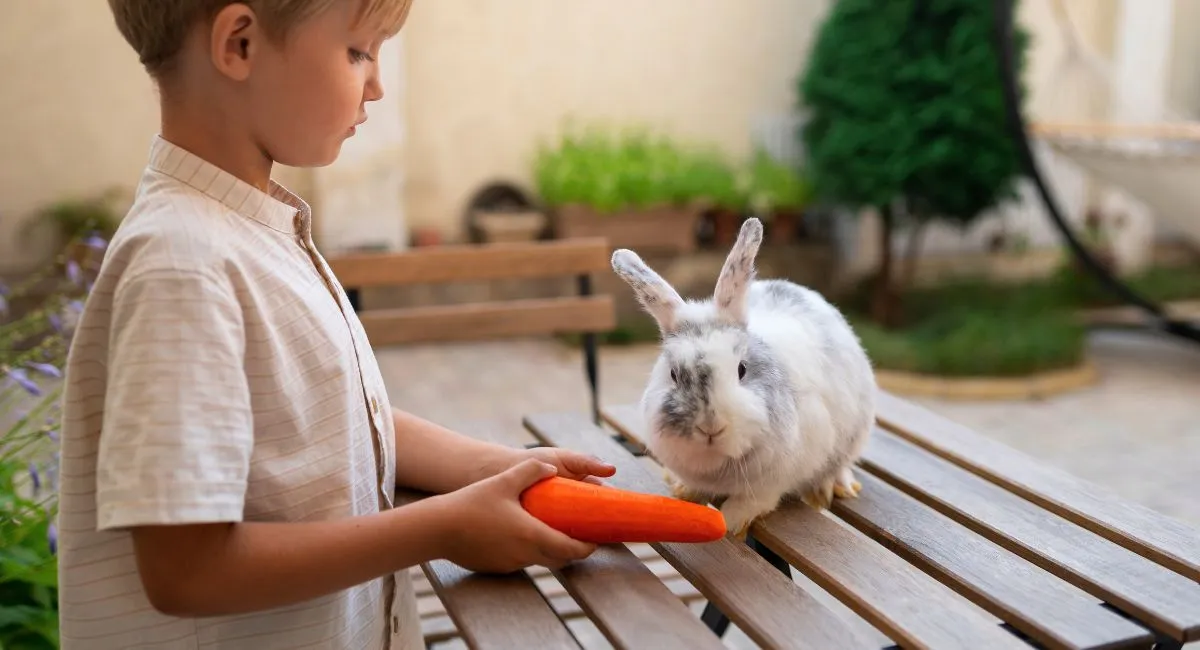Can Rabbits Eat Cucumbers? (In What Quantity)
Rabbits have sensitive digestive systems, so it’s crucial to be cautious about their diet. Cucumbers are a commonly available vegetable—but is it safe for them?
Cucumbers are safe for rabbits to eat. Rabbits enjoy them as refreshing treats and consider them generally safe. The main component of cucumbers is water, and they offer very little nutritional value. Rabbits who eat too much may experience diarrhea or loose stools.
When including cucumbers in a rabbit’s diet, consider:
- The parts of a cucumber that they can use – flesh, skin, seeds.
- Feeding amount that is appropriate.
- Health risks associated with overfeeding cucumbers.
- How much rabbits like them.
Which Parts of a Cucumber Are Safe for Rabbits?
Cucumbers include three components:
- Flesh (mostly water),
- Skin (contains more nutrients),
- Seeds.
Rabbits can eat all parts of cucumbers. The cucumber, which contains 96% water, should only be a small part of a rabbit’s diet. Fiber is necessary to rabbits’ digestive systems through hay and pellet intake. Eating a cucumber on its own can cause problems, as can eating too much water.
Cucumbers do not need to be peeled or seeds removed before feeding. Vitamins and minerals are found in abundance in the skin, which is why it offers the most nutritional benefits. Cucumbers should be thoroughly washed to remove pesticides or chemicals that might upset your rabbit.
The seeds of cucumbers are not toxic to rabbits, unlike those of some other fruits. There is no risk associated with consuming them.
The flesh of the animal has little nutritional value, but it is extremely hydrating. Moderation is essential, as excessive consumption may cause diarrhea.
How Much Cucumber Should Rabbits Eat?
Rabbits will likely eat an entire cucumber if you put it in front of them – this can cause problems.
Take one or two thin slices of cucumber no more than three to four times a week. You should consider these occasional treats. If you are not sure how your rabbit will react, start small and observe how he reacts. You should feed thin slices to your pet and monitor their stools. Cucumbers should be avoided or reduced if they soften. Increasing the serving can be done gradually if their stool remains normal.
Flemish Giants and Lionheads, which are smaller, can usually tolerate a single thin slice of cucumber, while smaller breeds can tolerate more.
The gradual introduction and observation method applies to any new food that a rabbit consumes. Start with small amounts and adjust only if there are no negative effects on stool or behavior.
What Happens if Rabbits Eat Too Much Cucumber?
Like humans eating too many cherries, rabbits can experience stomach troubles from overconsumption of cucumber due to its water content.
Potential issues include:
- Diarrhea or soft stool: Rabbits require a high-fiber diet to maintain solid stools. Cucumbers can disrupt their digestive balance if they are overhydrated.
- Weight loss: Cucumbers are low in calories. If they replace fiber-rich foods in the rabbit’s diet, it can lead to inadequate calorie intake.
- Nutrient deficiencies: Since cucumbers provide minimal nutritional value, over-reliance on them can lead to an imbalanced diet, lacking essential vitamins and minerals.
Cucumbers should only be given in small portions to avoid these problems.
Do Rabbits Enjoy Cucumbers?
The majority of rabbits do! They usually enjoy cucumber slices because they are tasty and refreshing. There are some rabbits, particularly younger ones (kits), who might not be interested. There is a higher likelihood of rabbits enjoying the taste as they get older.
You can discover whether your rabbit likes cucumbers by offering a freshly cut slice and watching their reaction. When people discover how delicious it is, they are eager to nibble and enjoy it.

